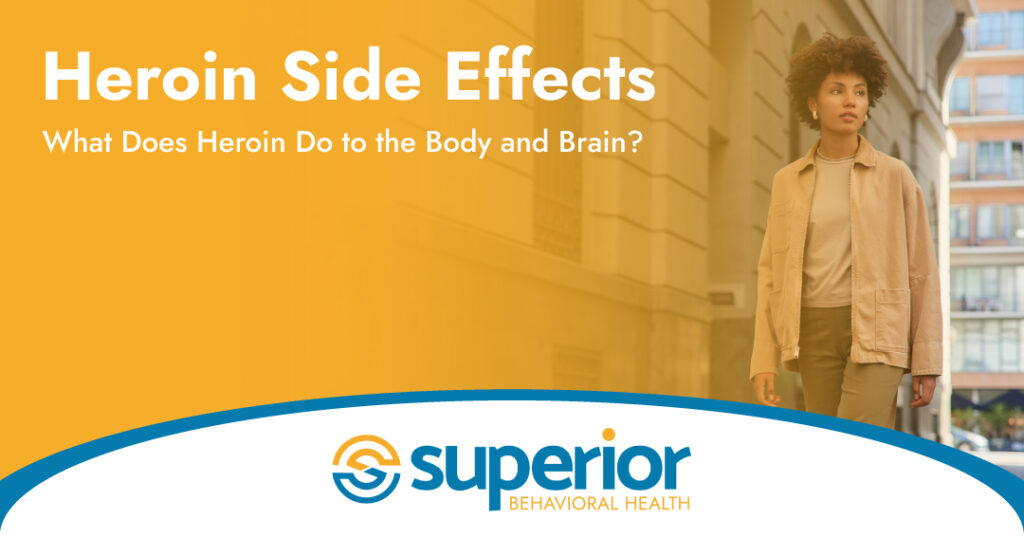You haven’t actually seen your best friend do heroin, but you have a nagging suspicion that he might be using it. He keeps borrowing money from you, and when you ask him what he’s going to do with it, he doesn’t seem confident in his answer. He’s always been a bad liar. Lately, it seems like he always has a runny nose and shaky hands. Is he using heroin?
If you can relate to the story above, you’re not alone. Recent polls found that one in every 200 people in Ohio used heroin at one point in their lives. We hear stories like this all the time at Superior Behavioral Health, too, from both concerned friends and the ones using heroin. The answer to the question above is maybe. The signs mentioned are all symptoms of heroin use, but here are more heroin side effects to look out for.
What Does Heroin Do to the Body and Brain?
Heroin is a depressant that slows down the central nervous system. The person who uses heroin often experiences slower breathing and a drop in blood pressure and body temperature.
Once heroin, a synthetic opioid, enters the brain, it binds to its opioid receptors. These opioid receptors are responsible for regulating pain and feelings of well-being, as well as releasing neurotransmitters such as dopamine. The release of dopamine is a large reason for the “high” that comes shortly after taking heroin.

The Effects of Heroin Abuse on Your Body and Life
Heroin use comes with both immediate and long-term effects on the body and the life of the person using heroin. Some occur immediately, while others develop over time.
Short-Term Side Effects of Heroin Use
Due to heroin’s fast-acting nature, some side effects appear quickly, and most commonly include the following:
- Euphoria
- Nausea and vomiting
- Dry mouth
- Limbs feeling heavy
- Flushed skin
- Itchiness
- Smaller pupils
- Drowsiness
- Disorientation
Long-Term Side Effects of Heroin Use
Long-term heroin use can severely impact the brain and body over time. Some potential long-term heroin side effects are:
- Collapsed veins from injecting heroin
- Blood infections from sharing needles
- Reproductive problems
- Kidney and liver disease
- Mental health conditions
- Lung diseases
- Chronic constipation
- Weight loss
- Blood clots due to additives in heroin
- Heroin use disorder
- Overdose
While the physical impact of heroin use is important, the lifestyle changes that come with heroin use disorders are just as impactful. People with heroin use disorders often report feeling like their lives revolve around trying to find heroin. This sometimes includes borrowing and stealing money from loved ones to pay for heroin, and withdrawing from relationships. Performance at work and school usually declines, and people with heroin use disorders often sleep more and neglect hygiene.
Heroin Addiction and its Withdrawal Symptoms
Long-term heroin use changes the chemical balance of your brain, with the brain anticipating the synthetic opioids of heroin as a replacement for making its own. This leads to feelings of depression when not using heroin, and individuals whose bodies become used to heroin in their system often have heroin withdrawals. Withdrawal can begin as early as a few hours after using heroin and is a large reason people develop heroin use disorders. Withdrawal symptoms include:
- Sweating
- Runny nose
- Diarrhea and vomiting
- Stomach ache
- Muscle and joint pain
- Agitation
- Mood swings
- Intense cravings for heroin
The Danger of Heroin Overdose
Individuals using heroin long-term run a higher risk of a heroin overdose because they consistently need to use higher doses to achieve heroin’s original effect. While it feels like they built up a tolerance to it, heroin never becomes easy for the body to handle or process, and the higher the dose, the more dangerous it becomes.
Keep an eye out for these symptoms of heroin overdose:
- Shallow and/or labored breathing
- Extremely low body temperature
- Blue lips and nails
- Cold and clammy skin
- Pinpoint pupils
- Delirium
If you notice anyone experiencing the symptoms of heroin overdose, seek medical attention immediately. Ohio’s Good Samaritan Law ensures you will have no legal trouble for helping someone experiencing a heroin overdose. If naloxone, a medication that can reverse the effects of overdose, is available, administer it while waiting for medical attention.

What is Heroin Addiction Treatment Like?
Heroin treatment usually begins with a detox phase in a treatment center. There, the person with the heroin use disorder is monitored by medical professionals as they go through the withdrawal process. After they’ve made it through withdrawal safely, they will move on to another program to receive further care. This will include therapy, and if needed, mental health treatment to get to the bottom of their substance use disorder.
Superior Behavioral Health is a local addiction treatment facility in Cleveland, Ohio. We offer a variety of services, such as medication-assisted therapy, outpatient programs, partial hospitalization programs, and mental health treatment. For more on how we can help you begin your recovery, call us at 216-435-1110.


